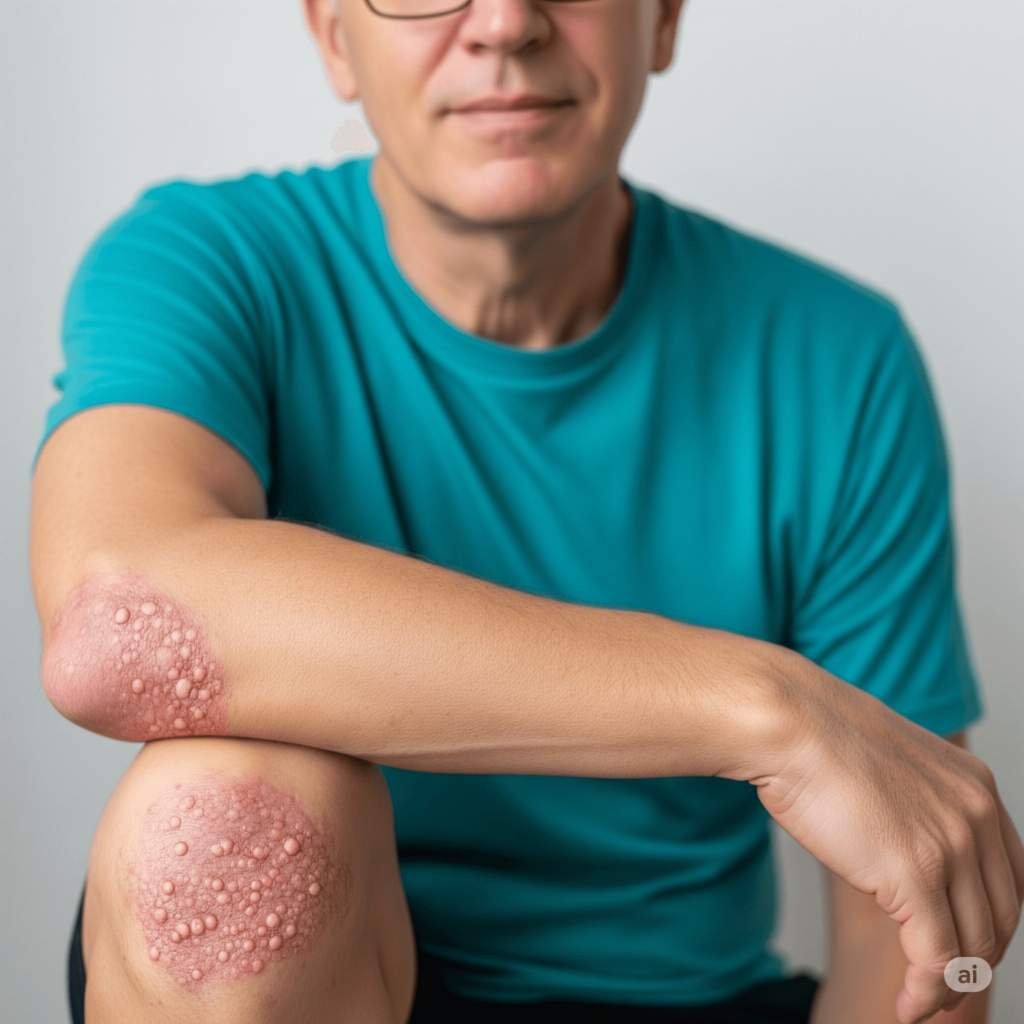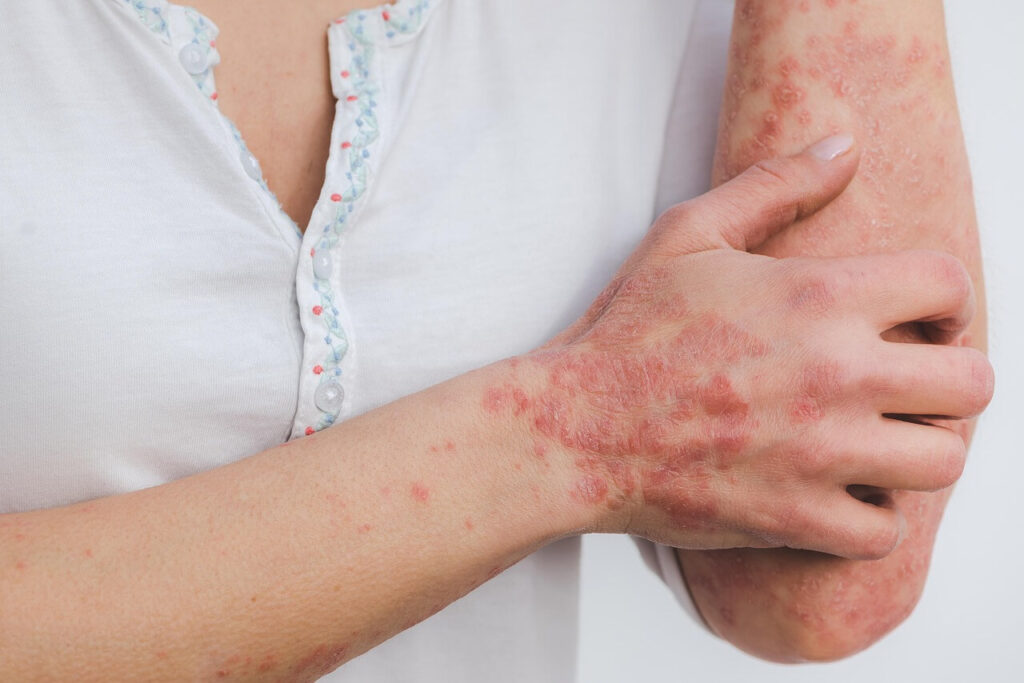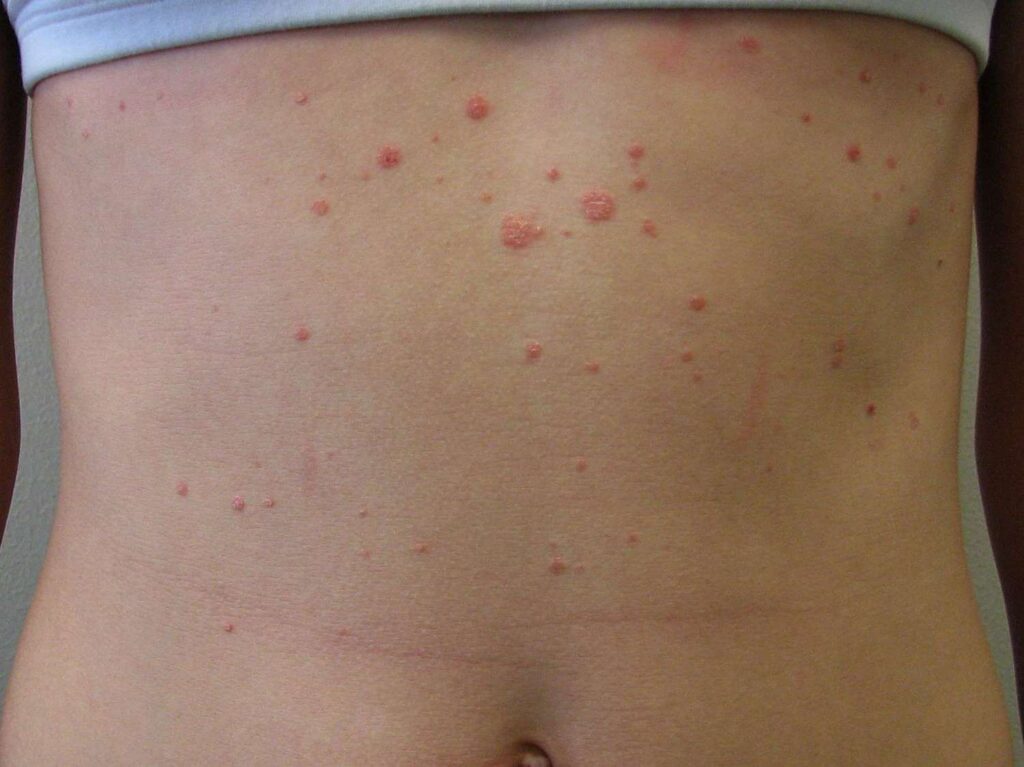
Psoriasis is a chronic, autoimmune skin condition characterized by the rapid build-up of skin cells, resulting in scaling, inflammation, and red patches on the skin. These patches are often itchy, painful, and may crack or bleed. Psoriasis affects approximately 2-3% of the global population, with an estimated 125 million people living with the condition worldwide, according to the National Psoriasis Foundation. It is not contagious but can significantly impact quality of life due to its physical and psychological effects.
Causes and Triggers:
Psoriasis occurs when the immune system mistakenly attacks healthy skin cells, accelerating their production. Normally, skin cells take about 28-30 days to grow, mature, and shed. In psoriasis, this process is shortened to 3-7 days, leading to the accumulation of immature cells on the skin’s surface.
Risk Factors:
1. Genetics: Research shows that psoriasis has a strong genetic component. About 30% of patients have a family history of the condition. Specific genes, such as HLA-Cw6, are strongly associated with psoriasis susceptibility.
2. Immune System Dysfunction: Psoriasis is driven by overactive T-cells and inflammatory cytokines (e.g., TNF-alpha, IL-17, IL-23), which trigger excessive skin cell production.
3. Environmental Triggers:
- Stress: Psychological stress can exacerbate symptoms.
- Infections: Streptococcal throat infections are linked to guttate psoriasis.
- Skin Injury: Cuts, burns, or trauma can trigger the Koebner phenomenon, where psoriasis develops at the injury site.
- Medications: Drugs like beta-blockers, lithium, or antimalarials may worsen symptoms.
- Weather: Cold, dry weather can aggravate psoriasis, while sunlight may improve it in some cases.
- Lifestyle Factors: Smoking, excessive alcohol consumption, and obesity are associated with increased severity.
Recent Research:
- A 2023 study in Nature Reviews Immunology highlighted the role of IL-23/IL-17 pathways in psoriasis, leading to targeted biologic therapies.
- Research from The Lancet (2024) suggests that gut microbiome dysbiosis may contribute to psoriasis, opening avenues for dietary interventions.
- A 2025 meta-analysis in Journal of Dermatological Science confirmed that obesity increases psoriasis severity, likely due to systemic inflammation.
Symptoms
Psoriasis presents in various forms, with symptoms varying in severity
- Plaque Psoriasis (most common): Red, raised patches with silvery-white scales, often on elbows, knees, scalp, or lower back.
- Guttate Psoriasis: Small, drop-shaped lesions, often triggered by infections.
- Inverse Psoriasis: Smooth, red patches in skin folds (e.g., armpits, groin).
- Pustular Psoriasis: White, pus-filled blisters surrounded by red skin.
- Erythrodermic Psoriasis: Widespread redness and scaling, a medical emergency.
- Psoriatic Arthritis: Joint pain, stiffness, and swelling, affecting up to 30% of psoriasis patients.
Associated symptoms include itching, burning, and skin tightness. Psoriasis can also impact mental health, leading to anxiety, depression, or social isolation due to visible lesions.
Treatment Options for Psoriasis

Psoriasis has no cure, but treatments can manage symptoms and improve quality of life. Treatment plans are individualized based on severity, type, and patient preferences.
1. Topical Treatments:
- Corticosteroids: Reduce inflammation and itching (e.g., hydrocortisone, clobetasol).
- Vitamin D Analogues: Slow skin cell growth (e.g., calcipotriene).
- Retinoids: Normalize skin cell turnover (e.g., tazarotene).
- Calcineurin Inhibitors: Reduce inflammation in sensitive areas (e.g., tacrolimus).
- Coal Tar: Reduces scaling and itching, available in creams or shampoos.
2. Phototherapy:
- Controlled exposure to UVB light slows skin cell turnover. Narrowband UVB is the most effective, as per a 2024 study in *Dermatology*.
- PUVA (psoralen + UVA) is used for severe cases but carries a risk of skin cancer.
3. Systemic Medications:
- Oral Medications: Methotrexate, cyclosporine, or acitretin for moderate-to-severe cases.
- Biologics: Target specific immune pathways (e.g., adalimumab, secukinumab, ixekizumab). A 2025 review in “JAMA Dermatology” reported biologics achieve 75-90% skin clearance in 12-16 weeks for many patients.
4. Emerging Therapies:
- JAK Inhibitors: Tofacitinib and other oral JAK inhibitors show promise for psoriasis and psoriatic arthritis (2024, Journal of Investigative Dermatology).
- Microbiome-Based Therapies: Probiotics and prebiotics are being studied for their potential to modulate gut inflammation.
5. Complementary Therapies:
- Aloe vera, oatmeal baths, and moisturizers can soothe skin.
- Mindfulness-based stress reduction (MBSR) has shown benefits in reducing flare-ups, per a 2023 study in Psychosomatic Medicine.
Deterrent Lifestyle and Dietary Changes
Lifestyle and dietary modifications can significantly reduce psoriasis flare-ups and improve overall health. Below are evidence-based recommendations:
1. Dietary Changes:

- Anti-Inflammatory Diet: Emphasize fruits, vegetables, whole grains, fatty fish (rich in omega-3s), and nuts. A 2024 study in Nutrients linked Mediterranean diets to reduced psoriasis severity.
- Gluten-Free Diet: Beneficial for patients with confirmed gluten sensitivity or celiac disease.
- Avoid Trigger Foods: Limit processed foods, red meat, dairy, and refined sugars, which may increase inflammation.
- Weight Management: Obesity worsens psoriasis. A 2025 trial in The American Journal of Clinical Nutrition found that a 5-10% weight loss reduced psoriasis severity by 50% in overweight patients.
- Supplements: Omega-3 fatty acids, vitamin D, and probiotics may help, but consult a doctor before starting.
2. Lifestyle Changes:

- Stress Management: Practice yoga, meditation, or deep breathing. A 2023 study in Dermatology and Therapy found that mindfulness reduced flare-ups by 20%.
- Quit Smoking: Smoking doubles the risk of psoriasis flares, per a 2024 *British Journal of Dermatology* study.
- Limit Alcohol: Excessive alcohol worsens symptoms and interacts with medications like methotrexate.
- Moisturize Regularly: Use fragrance-free, hypoallergenic moisturizers to prevent skin dryness.
- Sun Exposure: Moderate sunlight exposure (5-10 minutes daily) can improve symptoms, but avoid sunburn.
3. Avoid Triggers:
- Protect skin from trauma (cuts, scratches).
- Treat infections promptly, especially streptococcal infections.
- Monitor medications that may trigger flares.
Structured Plan for Psoriasis Patients

Step 1: Consult a Dermatologist
- Get a confirmed diagnosis and assess psoriasis type and severity.
- Discuss medical history, triggers, and lifestyle factors.
- Develop a personalized treatment plan (topical, phototherapy, or systemic).
Step 2: Create a Daily Management Routine
Morning:
- Apply prescribed topical treatments after a gentle cleanse.
- Use a fragrance-free moisturizer to lock in hydration.
- Take 5-10 minutes of sunlight exposure (if advised by your doctor).
Throughout the Day:
- Stay hydrated (aim for 8-10 glasses of water).
- Follow an anti-inflammatory diet (e.g., include salmon, spinach, or berries).
- Practice stress-relief techniques (e.g., 10-minute meditation).
Evening:
- Take a lukewarm oatmeal bath to soothe skin.
- Reapply moisturizer and topical treatments as prescribed.
- Avoid hot showers, which can dry out skin.
Step 3: Weekly Monitoring
- Track symptoms and triggers in a journal (e.g., flare-ups after stress or certain foods).
- Monitor for signs of psoriatic arthritis (joint pain, stiffness).
- Schedule phototherapy sessions if prescribed.
Step 4: Long-Term Lifestyle Goals
- Achieve and maintain a healthy weight (aim for a BMI of 18.5-24.9).
- Quit smoking and limit alcohol to 1-2 drinks per week.
- Join a support group (e.g., National Psoriasis Foundation) to manage psychological impact.
Step 5: Regular Follow-Ups
- Visit your dermatologist every 3-6 months to adjust treatments.
- Screen for comorbidities like cardiovascular disease, diabetes, or depression, which are more common in psoriasis patients.
Psychological and Social Support
Psoriasis can affect mental health due to its visibility and chronic nature. Patients may experience stigma or low self-esteem. Strategies include:
- Counselling: Cognitive-behavioural therapy (CBT) can address anxiety or depression.
- Support Groups: Online or in-person groups provide community and coping strategies.
- Education: Inform family and friends about psoriasis to reduce misconceptions.
Conclusion
Psoriasis is a complex condition requiring a multifaceted approach to management. By combining medical treatments, lifestyle changes, and dietary adjustments, patients can significantly reduce symptoms and improve their quality of life. Recent research underscores the importance of personalized care, targeting immune pathways, and addressing comorbidities. With a structured plan and consistent effort, patients can take control of their condition and live confidently.
Disclaimer: This article provides a comprehensive guide to create an awareness among patients suffering from psoriasis. However it is advised that patients should consult a healthcare professional before starting any treatment or lifestyle changes. For severe symptoms or suspected psoriatic arthritis, seek immediate medical attention.

